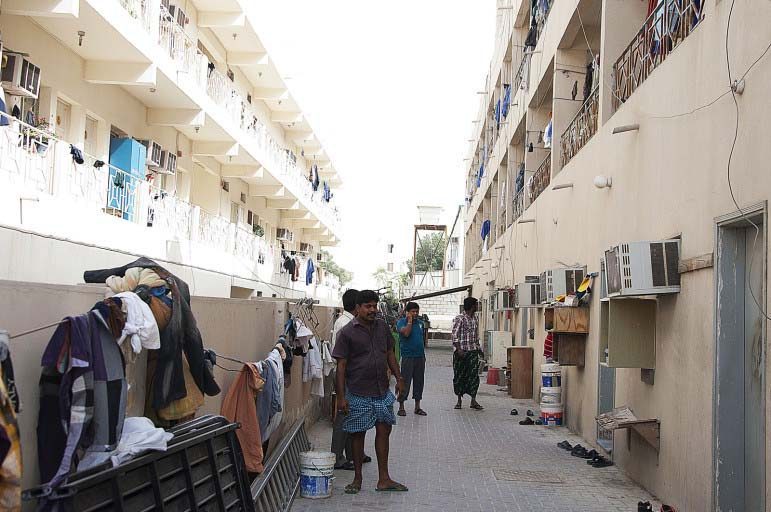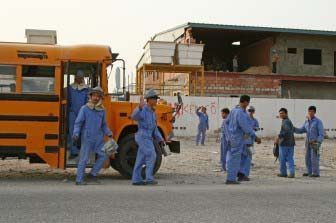
Harsher penalties for negligent employers and faster processing of labor-related complaints are among the recommendations that a leading expert on Qatar’s expat workforce is scheduled to present to government officials later today.
Andrew Gardner, an associate professor at the University of Puget Sound in the US, also calls for allowing migrants to legally work for other companies while pursuing a case against their employer, as well as additional translation services, as ways of improving migrants’ access to the justice system.
Gardner, who has studied migrant workers in Qatar and elsewhere in the Gulf for more than a decade, co-authored a report released today titled, Labour Migrants and Access to Justice in Contemporary Qatar.
He has documented the frequently cited hardships faced by low-income workers in the Gulf. Many migrants sign contracts in their home country that promise higher wages and different jobs that what await them in Qatar. Once in the country, many have their passports confiscated and are not paid on time or in full.
While human rights activists say the solution lies in an overhaul of Qatar’s sponsorship, or kafala, system that binds most expats to their employer, Gardner’s most recent report focuses on making the justice system more responsive to the needs of blue-collar workers.
“This is where corrections can be instigated and changes can be incrementally made,” he told Doha News.
He said his research suggests that those workers who file labor-related complaints over issues such as non-payment of wages and manage to “make it to the finish line” often receive a favorable ruling, but face hurdles along the way.
Challenges include understanding how to approach the justice system, language barriers, finding transportation to hearings and, in some cases, not having any income as their case proceeds.
“There is some optimism … The real issue is not finally what is getting decided in the courtroom, but it is getting to that point,” Gardner said.
He’s scheduled to meet with several ministers and bureaucrats later today to present his recommendations, which he said are in the interests of both migrants and the government.
“The state wants a better and more responsive justice system, because it’s their tool to manage the (migration) system. And migrants want a better system.”
Legal journey

For many workers who have not been paid, issued a residence permit or have otherwise had their employment contract breached, the journey typically begins at their country’s embassy in Qatar.
If mediation efforts by diplomats fail to resolve the issue, workers are generally advised to file a complaint at one of the Department of Labor Relations’ three branches. This leads to a meeting between the worker and their employer and, according to Gardner’s report, officials say they resolve 90 percent of the 350 to 400 cases received each month at this stage.
However, companies sometimes don’t co-operate or fail to follow through with promises made to the Department of Labor Relations. In such instances, the matter can be escalated to the Labor Court.
However, workers then face fresh challenges and delays, such as being forced to pay a fee of QR500-QR600 for an expert to examine their case, as well as strict requirements for serving company managers with official court notices.
Gardner’s report contains several case studies based on interviews with individual workers, including “Abdus,” who came to Qatar from Nepal to work as a welder:
“He was told that he would earn QR 1000 (US$275) per month, but for his first two months he received only QR 800 (US$220). Then his employer stopped paying him at all and reassigned him to work as a ‘helper,’ first in carpentry and then in construction … (Owed five months salary) he went to the Industrial Area office of the Department of Labor Relations on seven consecutive days. No one from his company appeared at any of the appointments …
“Because his sponsor failed to appear at the Department of Labor Relations, his case was referred to Labor Court. He went to the Labor Court to file his case and was given his first court date for three months later. After that, he was typically given subsequent court dates approximately once per month. At most of these appearances in court, Abdus was simply told to return the following month.
“After several months of unemployment, he began working illegally as a gardener for his brother’s sponsor. In the end, approximately ten months after he filed the initial complaint, Abdus received the court-ordered QR 4500 (US$1,236) in compensation from the company.”
Solutions

During this legal process, companies typically stop paying the worker and cease providing them with food and accommodations, according to an embassy source cited by Gardner.
This can force the migrant to borrow money from friends, work illegally or obtain assistance from their embassy and serves as a disincentive for workers to pursue their case through to completion.
While the Ministry of Interior can theoretically grant a worker a no-objection certificate allowing them to change sponsors, Gardner recommends making it easier for migrants who have filed a labor complaint to seek alternative employment.
Additionally, he calls for sanctions against employers who fail to pay their employees or otherwise break the law. The report said courts do not currently have the ability to apply disciplinary sanctions against companies, such as financial penalties.
“Without more punitive measures, it is quite easy for abusive employers … (to) stop paying migrants. At worst, they may be forced to pay them (what they’re owed),” Gardner said.
Other recommendations include:
- Giving the Department of Labor Relations the capacity to compel employers and/or sponsors to appear for proceedings and negotiations;
- Make it the responsibility of the Department of Labor Relations, rather than migrants, to pass necessary documentation on to employers;
- The Department of Labor Relations should have follow-up meetings with some of the migrants whose cases it negotiates to assess how often employers fulfil agreements negotiated there;
- Signs in the Department of Labor Relations and Labor Court should be in multiple major languages and translators should be provided;
- Upon winning a case, migrants should be able to quickly receive compensation. Typically, migrants need to file a separate case in order to receive the compensation determined in the initial case.
Government action

In recent months, Qatar has taken several steps aimed at making it easier for workers to file grievances against their employers.
This includes setting up multilingual electronic kiosks for workers to lodge complaints and mandating that employees be paid by direct bank deposit, which would more clearly document how much – and when – an individual has been paid.
More broadly, Gardner said the Qatar government is generally receptive to the advice of researchers on migrant issues. He added that contrasts with other Gulf countries with similar issues related to their foreign workforce.
“In the UAE, these issues are off the table. They’s not things that foreigners should be looking at or writing about. Here, these things are entertained,” he said.
Here’s a copy of the full report:
Labour Migrants and Access to Justice in Contemporary Qatar
Thoughts?







